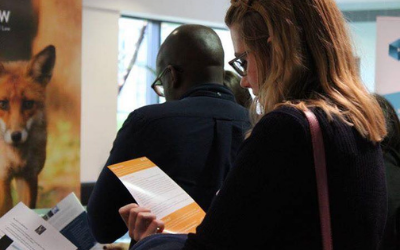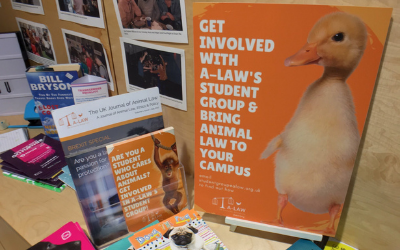By Tiffany Mitchell, A-law Legal Support Officer
“Rodeos are events in which animals are subjected to violence and cruelty in the name of ‘sport,’”[1] states the New Zealand SPCA. Although the SPCA is advocating for a ban, rodeos are not yet banned in New Zealand. And while, in 2017, Labour’s animal welfare spokesperson Trevor Mallard had promised to ban the use of flank straps, electric prodders, and calf roping in New Zealand, the agricultural minister now says those issues are ‘off the table.’
But there are several countries and cities that have achieved complete bans on rodeos, including the Netherlands; Pasadena, California; and St. Petersburg, Florida. Other jurisdictions have implemented restrictions including outlawing calf roping and restricting the usage of electric prods, flank straps, and spurs. As for the UK, rodeos were previously banned under the Protection of Animals Act 1934. That Act was repealed and replaced with the Animal Welfare Act 2006, and although the AWA no longer has a specific prohibition on rodeo, the thought process at the time of passage was that any attempts in the UK to revive rodeos would be quashed under the new welfare offence and possibly the unnecessary suffering offence.
In Canada, the city of Vancouver and the district of North Vancouver passed a complete ban on rodeo events. Surrey, another city in British Columbia, is also curtailing rodeo events: In 2017, Surrey’s Cloverdale Rodeo Association outlawed what some would classify as the cruellest and arguably least traditional parts of rodeo, such as calf roping, team roping, steer wrestling, and wild-cow milking. The British Columbia SPCA is vocal about their stance on rodeos, stating;
The BC SPCA is opposed to the infliction of pain or suffering upon, or the killing of any farm animal for the purpose of recreation, sport or entertainment. Accordingly, the BC SPCA opposes events that function by causing fear, frustration, anxiety, pain or injury to an animal, whether or not they are sanctioned by a professional rodeo association.
Calgary Stampede
While several Canadian provinces host a plethora of rodeo competitions, the Calgary Stampede is the most widely attended, yet arguably the most disputed among locals, animal welfare NGOs, Canadian legal organisations, and Canadians in general (according to the Vancouver Humane Society, a 2015 survey conducted by Insights West found that 66% of BC residents opposed rodeos and 63% of Canadians opposed rodeos). The ‘chuckwagon’ races, in which drivers in a kind of covered wagon lead a team of horses around a track, claimed the lives of six horses in 2019. The Calgary Stampede of 2019 was noted as the second deadliest to date. Even so, the event receives global attention and visitors are still persuaded to attend “The Greatest Outdoor Show on Earth”. The 2020 stampede was scheduled for early July but was cancelled in light of COVID-19. However, it does not seem like Stampede organisers used this cancellation as an opportunity to reflect on continuation of the Stampede or rodeos, as they have commenced planning for 2021 and beyond.
What is Rodeo?
Rodeo is a competitive sport that originated to reflect practices involved in herding cattle. It started with Spanish ranchers and their Mexican ranch hands in the Americas. Initially, the events were based on required skills of the working vaqueros of the Iberian Peninsula, a mountainous region associated with Spain and Portugal. Later, the practices were adopted in Western parts of the United States and Canada, where the term cowboys was coined.
Today, the sport attempts to test the speed and skill of participants. In Canada, the Canadian Professional Rodeo Association (CPRA) states that rodeo occurs in the name of culture and traditional practice, although some organisations and citizens believe this to be a pretext for what is actually a competition with large cash prizes. Peter Fricker of the Vancouver Humane Society maintains that despite the promoters’ statements, rodeo has little to do with genuine ranch practices. For example, steer wrestling was invented in the 1930s for the sole purpose of rodeo, and bull riding has no agricultural purpose whatsoever.
What does Rodeo entail?
Generally, an American-style professional rodeo comprises team roping, tie down roping, bareback ‘bronc’ riding, bull riding, barrel racing, chuckwagon racing, steer wrestling, and saddle bronc riding. Some events cause greater concern for animal welfare than others, such as tie-down roping or calf roping, steer wrestling, and chuckwagon racing. According to the Vancouver Humane Society as reported by The Daily Hive, “rodeo events, such as calf roping, steer wrestling, and chuckwagon racing, often lead to severe trauma, injury, or death of the animals involved, and are done merely for the purpose of entertainment.”
The timed events cause additional concern, since contestants are racing for the fastest time. When competing to finish first, in order to win a large cash prize, the ability to keep animal welfare in mind is difficult, increasing the risk for distress and injury. Additionally, practice trials, taking place prior to the event to prepare the participants, have much less transparency.
Chuckwagon racing is controversial due to the nature of the event, and injury could be seen as inevitable. The race requires multiple teams of horses pulling wagons around a figure-eight course. Horses suffer from wagon collisions as well as heart attacks from the stress.
In calf roping, also known as tie-down roping, a cowboy on a horse chases after the animal once they are released from the chute. The cowboy then tries to rope the running calf around their neck. Once roped, the cowboy jumps off his horse, goes to the roped animal, and ties three of their legs together. To receive prize money, the cowboy has to do this the fastest. If the roped animal has fallen down, the cowboy must wait for them to stand back up so he can then ‘flank’ the animal: grabbing the animal by its neck and outer hip and throwing it onto the ground. This event is highly criticised due to animal’s young age, the nature of roping at such high speeds, the flanking manoeuvre, and the alleged abuse in the chute before the animal is released – which the public does not see. Several rodeos have outlawed this event.
Steer wrestling requires the contestant to jump off the horse and grab a steer that is running straight at the contestant, with the help of a ‘hazer’. A hazer ensures the animal runs directly to the wrestler. He grabs the neck and head of the steer with both arms, twisting the neck until the animal falls to the ground, potentially and obviously resulting in neck injuries. During the 2004 Cloverdale Rodeo, a steer died after its neck was broken during this event.
Saddle bronc riding represents the ‘breaking’ or training of the horse to make it compliant on ranches. The rider digs their boot spurs into the animals’ shoulders in order to control the animal. A similar process is involved in training wild circus animals to perform.
Canadian Professional Rodeo Association and Rodeo Regulation
The Canadian Professional Rodeo Association (CPRA), established in 1944 as the Cowboys Insurance Association, is the governing body of professional rodeos in Canada. The CPRA website states “most [rodeo participants] have more than a monetary tie to their animals”. The association also says that “animal welfare is a major ongoing initiative of the Canadian Professional Rodeo Association and we pledge to continue the strict enforcement of our rules and regulations.”
Despite this claim, the animal welfare guidance provided on their website is voluntary for participants, with a mere three-page spread of voluntary protocols in 24 pages. Additionally, the association’s by-laws and rules are self-enforced, decreasing accountability. In the Code of Practice for the Care & Handling of Rodeo Livestock, the CPRA explains, “We accept an added responsibility that goes with our chosen lifestyle, the welfare of our animal competitors. We continue to be proactive in regard to the care and handling of our rodeo livestock.” They personify the animals as competitors in the rodeo, but without the protection that should come with this label.
The fines for animal cruelty may also suggest a lack of care regarding animal protection and welfare during these events. In the CPRA Rule Book, Section XII – MISCELLANEOUS, section A. Rules to Ensure Humane Treatment of Livestock: any ‘intentional’ abuse of an animal in the first instance results in a fine of $250. The rule clearly states “it must be intentional harm”, providing an escape clause for potential abuse. Challenging any given fine costs that member $250, equal to the intentional animal abuse fine.
In comparison, the Code of Conduct for Rodeo states that any member with an ‘unprofessional’ appearance will be fined $200, doubling with each offence. Comparing this fine to the almost equal $250 fine for intentional animal cruelty arguably shows a lack of concern about animal welfare, as does the absence of penalty or fine for the breaking of a horn on the steer during steer wrestling. Considering the high cost to be a member of the CPRA and participate in the rodeo, a $250 fine is an unlikely deterrent for animal cruelty. Given the term “intentional” cruelty, a successful conviction of animal cruelty is unlikely.
The Canadian Veterinary Medical Association
Regarding animals used in entertainment, the Canadian Veterinary Medical Association (CVMA) website states they are opposed to “activities, contests, or events that have a high probability of causing injury, distress, or illness.” CVMA says animals should not be forced to perform actions or tasks that result in physical or mental distress or discomfort. They proclaim that animal welfare advocacy is their priority. Despite these statements, the CVMA supports rodeo events across Canada.
Canadian Laws
Stampede CEO Warren Connell stated, after the fatal chuckwagon incidents of the 2019 Stampede, “We live and work as a family committed to the well-being of our beloved animals and this type of incident impacts us deeply to the core.” In contrast, Camille Labchuk, one of Canada’s leading animal rights lawyers and the Executive Director at Animal Justice, stated, “I don’t think it’s particularly important whether somebody follows to the letter their internal rules, when we know that everyone participating in this event can foresee that those horses are going to die.”
According to Canada’s Criminal Code, everyone commits an offence who “wilfully causes or, being the owner, wilfully permits to be caused unnecessary pain, suffering or injury to an animal or a bird.” The Alberta Animal Protection Act likewise states “no person shall cause or permit an animal of which the person is the owner or the person in charge to be or to continue to be in distress.” The section does not apply, however, if the distress results from an activity carried out in accordance with the regulations or in accordance with reasonable and generally accepted practices of animal care, management, husbandry, hunting, fishing, trapping, pest control or slaughter. Under this section, distress could mean injured, sick, in pain, suffering, abused, or subjected to undue hardship, privation or neglect. Considering how rodeos are depicted and protected as traditional practice and sport in Canadian society, it seems interpretation of these laws have considered rodeo practices to fall within acceptable practice, despite what many would consider a clear violation.
A Test Case
In 2017, Professor Alain Roy of Quebec challenged the legality of the Montreal Rodeo under the Animal Welfare and Safety Act, which prohibits “all abuse or mistreatment that may affect the health of animal beings, or any action or omission that exposes them to distress.” This legal challenge was supported by an investigation conducted by Dr. Jean-Jacques Kona-Boun, veterinarian and anaesthesiologist, who, after witnessing 45 hours of live rodeo events in Quebec, concluded:
The rodeo activities held in accordance with the standards in effect in Montreal and St-Tite subject horses and bulls to the risk of injury such as fractures and other serious injuries. The same is true of the calf roping and steer wrestling. The psychological distress experienced by all the animal beings used in such activities is also very real.
Professor Roy withdrew his legal challenge and the parties made an agreement out of court, which included the creation of an advisory committee on rodeo safety.[2] The committee would include three animal rights experts.
A Plausible Future
The Cloverdale Rodeo in Surrey, British Columbia, shows that some progress in protecting animal interests while continuing a rodeo is possible. Cloverdale stopped major rodeo events like calf-roping and steer wrestling following petitions and pressure. Despite this, their annual fair still draws crowds to the spectacle. That attendance is strong even after removal of some animal events supports the notion that fans of rodeo will still enjoy the event if animal cruelty is reduced, and that animal cruelty isn’t culturally relative. We can still be very proud of our heritage whilst being very mindful of how we educate others and interact with sentient animals.[3]
[1] https://www.spca.nz/advice-and-welfare/article/the-cruelty-of-rodeos#:~:text=Rodeos%20are%20events%20in%20which,injury%2C%20and%20sometimes%20even%20death.
[2] https://www.cbc.ca/news/canada/montreal/injunction-dropped-rodeo-to-go-ahead-in-montreal-this-summer-1.4150756
[3] http://www.animallaw.com/Model-Law-Rodeos.cfm#commentary
Other sources:
https://aldf.org/article/rodeo-facts-the-case-against-rodeos/
https://www.cbc.ca/news/canada/calgary/calgary-stampede-animal-horse-deaths-total-1.5212439
https://spca.bc.ca/ways-to-help/take-action/working-animals/rodeos/
https://dailyhive.com/vancouver/abbotsford-rodeo-animal-cruelty
https://dailyhive.com/vancouver/abbotsford-rodeo-animal-cruelty
http://www.rodeocanada.com/animal_welfare.htm
http://www.vancouverhumanesociety.bc.ca/campaigns/rodeos/
https://www.alainroy.ca/a-propos/dossier-rodeo/
https://www.rnz.co.nz/news/national/408833/govt-backs-down-on-promise-to-ban-elements-of-rodeo
https://www.globalanimallaw.org/experts/alain-roy.html







